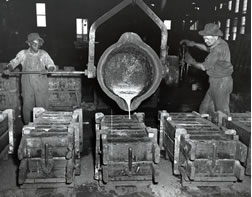Transforming the Economy

As Tennesseans gained new opportunities in the aftermath of the Civil War they also sought out new ways to nurture their families and serve their communities. Historical accounts vary but all agree that the state faced daunting economic challenges after four years of war and three years of military occupation. Tennesseans responded to these challenges in different, often creative ways.
Scholarly Essay
New Economies, New Communities: 1865-1915 by Carroll Van West
Lesson Plan
Agriculture
Many European immigrants and those from rural communities in the British Isles had settled in Tennessee on familiar terrain so they could practice known agricultural methods. English and Scots-Irish settlers grew corn and wheat and practiced the art of distilling grains for liquor. Swiss and German immigrants developed some of Tennessee’s earliest dairies and planted early vineyards of grapes and hops. ...More
Industry
From the earliest days, Tennessee’s inhabitants drew upon its natural resources, using hand labor to craft tools and necessities. The wealth of timber, stone, and running water made good farm sites. Veins of red iron ore in East Tennessee and brown iron ore on the Western Highland Rim meant early forges and furnaces. ...More
Infrastructure
One constant feature of Tennessee’s transportation network over the past 125 years has been the Frisco Bridge in Memphis. When it opened on March 12, 1892, the bridge was one of the longest railroad bridges in the world. ...More
Jim Crow Train, performed by Josh White in 1941. Full item record.
Professional Services
The Freedmen’s Savings Bank and Trust Company was established in 1865 to give newly freed slaves the opportunity to save and gain financial stability. Thirty-three branches were spread across the South, with branches opening in Nashville and Memphis in 1865, followed by Chattanooga (1868) and Columbia (1870). The bank was closed in 1874 due to mismanagement and the financial panic of 1873-74. ...More
Government & Military
At the close of the American Civil War, the “Reconstruction” of the rebellious former states included federal troops who stayed in place to enforce federal laws, keep order, protect the citizenry and assist with post-War economic recovery ....More